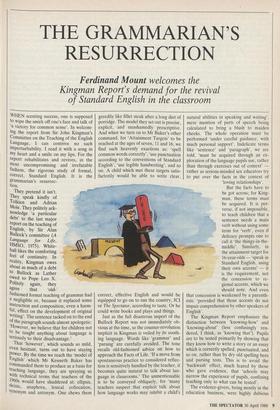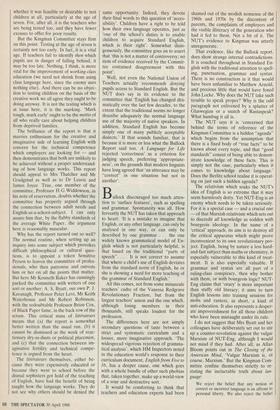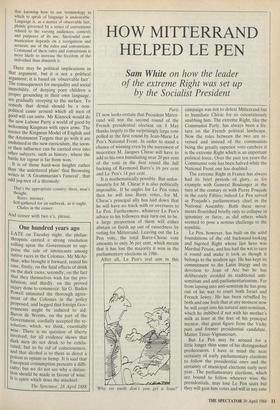THE GRAMMARIAN'S RESURRECTION
Ferdinand Mount welcomes the
Kingman Report's demand for the revival of Standard English in the classroom
WHEN scenting success, one is supposed to wipe the smirk off one's face and talk of • 'a victory for common sense'. In welcom- ing the report from Sir John Kingman's Committee on the Teaching of the English Language, I can contrive no such imperturbability. I read it with a song in my heart and a smile on my lips. For the report rehabilitates and revives, in the most uncompromising and irrefutable fashion, the rigorous study of formal, correct, Standard English. It is the grammarian's resurrec- tion.
They pretend it isn't. They speak kindly of Tolkien and Adrian Mole. They politely ack- nowledge 'a particular debt' to the last major report on the teaching of English, by Sir Alan Bullock's committee (A Language for Life, HMSO, 1975). White- hall likes the comforting feel of continuity. In reality, Kingman owes about as much of a debt to Bullock as Luther owed to Pope Leo X. Politely again, they agree that 'old- fashioned formal teaching of grammar had negligible or, because it replaced some Instruction and composition, even a harm- ful, effect on the development of original writing'. The sentence tacked on to the end of the paragraph sounds almost apologetic: However, we believe that for children not to be taught anything about language is seriously to their disadvantage.' That 'however', which sounds so mild, even hesitant, turns out to have staying Power. By the time we reach the 'model of English' which Mr Kenneth Baker has commanded them to produce as a basis for teaching language, they are spraying us with technical terms that teachers of the 1960s would have shuddered at: ellipsis, delxis, anaphora, lexical collocation, Synonym and antonym. One chews them greedily like fillet steak after a. long diet of porridge. The model they set out is precise, explicit, and unashamedly prescriptive. And when we turn on to Mr Baker's other command, for 'Attainment Targets' to be reached at the ages of seven, 11 and 16, we find such heavenly exactions as: 'spell common words correctly', 'use punctuation according to the conventions of Standard English', 'use legible handwriting', and so on. A child which met these targets satis- factorily would be able to write clear, correct, effective English and would be equipped to go on to run the country, ICI or The Spectator, according to taste. Or he could write books and plays and things.
Just as the full disastrous import of the Bullock Report was not immediately ob- vious at the time, so the counter-revolution implicit in Kingman is veiled by its sooth- ing language. Words like 'grammar' and 'parsing' are carefully avoided. The tone recalls old-fashioned advice on how to approach the Facts of Life. 'If a move from spontaneous practice to considered reflec- tion is sensitively handled by the teacher, it becomes quite natural to talk about lan- guage in classrooms.' The unmentionable is to be conveyed obliquely, for 'many teachers suspect that explicit talk about how language works may inhibit a child's natural abilities in speaking and writing', mere mention of parts of speech being calculated to bring a blush to maiden cheeks. The whole operation must be performed 'under careful guidance, with much personal support'. Indelicate terms like 'sentence' and 'paragraph', we are told, 'must be acquired through an ex- ploration of the language pupils use, rather than through exercises out of context' — rather as serious-minded sex educators try to put over the facts in the context of 'loving relationships'.
But the facts have to be got across; for King- man, these terms must be acquired. It is per- verse, if not impossible, to teach children that a sentence needs a main verb without using some term for 'verb', even if delicacy prompts one to call it 'the thingy-in-the- middle'. Similarly, in the attainment target for 16-year-olds — 'speak in Standard English, using their own accents' — it is the requirement, not the concession to re- gional accents, which we should note. And even that concession is weakened by a parenth- esis: 'provided that those accents do not impair comprehension by other speakers of English'.
The Kingman Report emphasises the distinction between 'knowing-how' and 'knowing-about' (less confusingly ren- dered, I think, as 'knowing that'). Pupils are to be tested primarily by showing that they know how to write a story or an essay which is correctly spelled, punctuated, and so on, rather than by dry old spelling bees and parsing tests. This is to avoid the 'backwash' effect, much feared by those who gave evidence, that 'schools may narrow the experience of pupils, confining teaching only to what can be tested'.
The evidence-givers, being mostly in the education business, were highly dubious whether it was feasible or desirable to test children at all, particularly at the age of seven. For, after all, it is the teachers who are being tested too, and they have fewer excuses to offer for poor results.
But the Kingman Committee stays firm on this point. Testing at the age of seven is certainly not too early. In fact, it is a vital age. If teachers fail to identify then which pupils are in danger of falling behind, it may be too late. Nothing, I think, is more vital for the improvement of working-class education (we need not shrink from using class language here, since the enemy uses nothing else). And there can be no objec- tion to testing children on the basis of the creative work we all agree they ought to be doing anyway. It is not the testing which is at issue here, it is the marking. 'Mark tough, mark early' ought to be the motto of all who really care about helping children from deprived families.
The brilliance of the report is that it marries enthusiasm for the creative and imaginative side of learning English with concern for the technical competence which employers are looking for — and then demonstrates that both are unlikely to be achieved without a proper understand- ing of how language works. This report should appeal to Mrs Thatcher and Mr Gradgrind as well as to Dr Leavis and James Joyce. True, one member of the committee, Professor H.G.Widdowson, in his note of reservation, doubts whether the committee has properly argued through the connection between adult needs and English-as-a-school-subject. I can only assure him that, by the flabby standards of the average White Paper, the argument here is reasonably muscular: Why has the report turned out so well? The normal routine, when setting up an inquiry into some subject which provokes difficult philosophical or cultural ques- tions, is to appoint a token Sensitive Person to leaven the committee of profes- sionals, who then patronise and outvote him or her on all the points that matter. But here Mr Kenneth Baker has cunningly packed the committee with writers of one sort or another: A. S. Byatt, our own P. J. Kavanagh, Professor Peter Levi, Mr Keith Waterhouse and Mr Robert Robinson, with the redoubtable Professor Brian Cox, of Black Paper fame, in the back row of the scrum. This critical mass of litterateurs means that (a) the report is somewhat better written than the usual run, (b) it cannot be dismissed as the work of reac- tionary dry-as-dusts or political placemen, and (c) that the connection between im- aginative fertility and technical compe- tence is argued from the heart.
The litterateurs themselves, either be- cause they were expensively educated or because they went to school before the dismal sophisters got hold of the teaching of English, have had the benefit of being taught how the language works. They do not see why others should be denied the same opportunity. Indeed, they devote their final words to this question of 'acces- sibility'. Children have a right to be told how their own language operates, just as 'one of the school's duties is to enable children to acquire Standard English, which is their right'. Somewhat disin- genuously, the committee goes on to assert that 'this is not a matter of controversy; no item of evidence received by the Commit- tee contained disagreement with this point'.
Well, not even the National Union of Teachers actually recommends denying pupils access to Standard English. But the NUT does say in its evidence to the committee that 'English has changed dra- matically over the last few decades, to the extent that the traditional norms no longer describe adequately the normal language use of the majority of native speakers. In addition, Standard English has become simply one of many publicly acceptable dialects.' If that sounds familiar, that is because it is more or less what the Bullock Report said too. A Language for Life rejected 'correctness' as a criterion for judging speech, preferring 'appropriate- ness', on the grounds that modern linguists have long agreed that 'an utterance may be "correct" in one situation but not in another'.
Bullock discouraged too much atten- tion to 'surface features', such as spelling and grammar. Spontaneity was all. How fervently the NUT has taken that approach to heart: 'It is a mistake to imagine that English, or any other language, can only be analysed in one way, or can only be described by one grammar . . . the one widely known grammatical model of En- glish which is not particularly helpful, is that based on the traditional "parts of speech". . . . It is not correct to assume that where a child's use of English deviates from the standard norm of English, he or she is showing a need for more teaching of the grammar of Standard English.'
All this comes, not from some minuscule teachers' cadre of the Vanessa Redgrave Revolutionary Fraction, but from the largest teachers' union and the one which, although losing members in their thousands, still speaks loudest for the profession.
The differences here are not simply secondary questions of taste between a strict and systematic curriculum and a looser, more imaginative approach. 'The widespread vigorous rejection of gramma- tical analysis', which HM Inspectors noted in the education world's response to their curriculum document, English from Five to 16, has a deeper cause, one which goes with a whole bundle of other such phobias that, taken together, make up a world-view of a sour and destructive sort.
It would be comforting to think that teachers and education experts had been shamed out of the modish nonsense of the 1960s and 1970s by the discontent of parents, the complaints of employers and the visible illiteracy of the generation who had it fed to them. Not a bit of it. The NUT's evidence to Kingman was utterly unregenerate.
That evidence, like the Bullock report, does show strange internal contradictions. It is couched throughout in Standard En- glish with the traditional attention to spell- ing, punctuation, grammar and syntax. There is no construction in it that would have been unfamiliar to Matthew Arnold, and precious little that would have foxed John Locke. Why does the NUT take such trouble to speak proper? Why is the odd paragraph not enlivened by a splutter of Glaswegian or a snatch of Rastaspeak? What humbug it all is.
The NUT says it is 'concerned that behind the terms of reference of the Kingman Committee is a hidden "agenda" which begins from the assumption that there is a fixed body of "true facts" to be known about every topic, and that "good standards" consist of being able to demon- strate knowledge of these facts. This is simply not the case, particularly when it comes to knowledge about language.' Does the Berlitz school realise it is operat- ing on just such a hidden agenda?
The relativism which soaks the NUT's idea of English is so extreme that it may seem harmlessly dotty. Yet NUT-Eng is an enemy which needs to be taken seriously. For it is a special case — and a crucial one — of that Mantish relativism which sets out to discredit all knowledge as sodden with bourgeois ideology. In the name of a 'critical' approach, its aim is to destroy all the critical apparatus which might prove inconvenient to its own revolutionary pro- ject. English, being by nature a less hard- and-fast subject than maths or chemistry, is especially vulnerable to this kind of treat- ment. It is also especially valuable. If grammar and syntax are all part of a ruling-class conspiracy, then why bother with them, or with bourgeois logic? NUT- Eng claims that 'oracy' is more important than stuffy old literacy; it aims to turn English lessons into training sessions for mobs and ranters, in short, a kind of anti-education. It also represents a desper- ate impoverishment for all those children who have been mistaught under its rule.
I do not suggest that Mrs Byatt and her colleagues have deliberately set out to stir up a counter-revolution against the vulgar Marxism of NUT-Eng, although I would not mind if they had. After all, as Allan Bloom points out in The Closing of the American Mind, 'Vulgar Marxism is, of course, Marxism.' But the Kingman Com- mittee confine themselves strictly to re- stating the ineluctable truth about lan- guage:
We reject the belief that any notion of correct or incorrect language is an affront to personal liberty. We also reject the belief
that knowing how to use terminology in which to speak of language is undesirable. Language is, as a matter of observable fact. plainly governed by a series of conventions related to the varying audiences, contexts and purposes of its use. Successful com- munication depends on a recognition and accurate use of the rules and .conventions. Command of these rules and conventions is more likely to increase the freedom of the individual than diminish it.
There may be political implications in that argument, but it is not a political argument; it is based on 'observable fact'. The consequences for inequality and social immobility, of denying poor children a proper grounding in their own language, are gradually creeping to the surface. To remedy that denial should be a non- political cause around which all men of good will can unite. Mr Kinnock would do the new Labour Party a world of good by welcoming Kingman with open arms. The sooner the Kingman Model of English and the Attainment Targets that go with it are enshrined in the new curriculum, the soon- er their influence can be carried over into Other subjects, such as history, where the battle for rigour is far from won. It is of those hard-won heights rather than 'the unlettered plain' that Browning writes in 'A Grammarian's Funeral', that odd jog-trot of a threnody:
That's the appropriate country; there, man's thought, Rarer, intenser, Self-gathered for an outbreak, as it ought, Chafes in the censer.
And censer with two e's, please.




























































 Previous page
Previous page